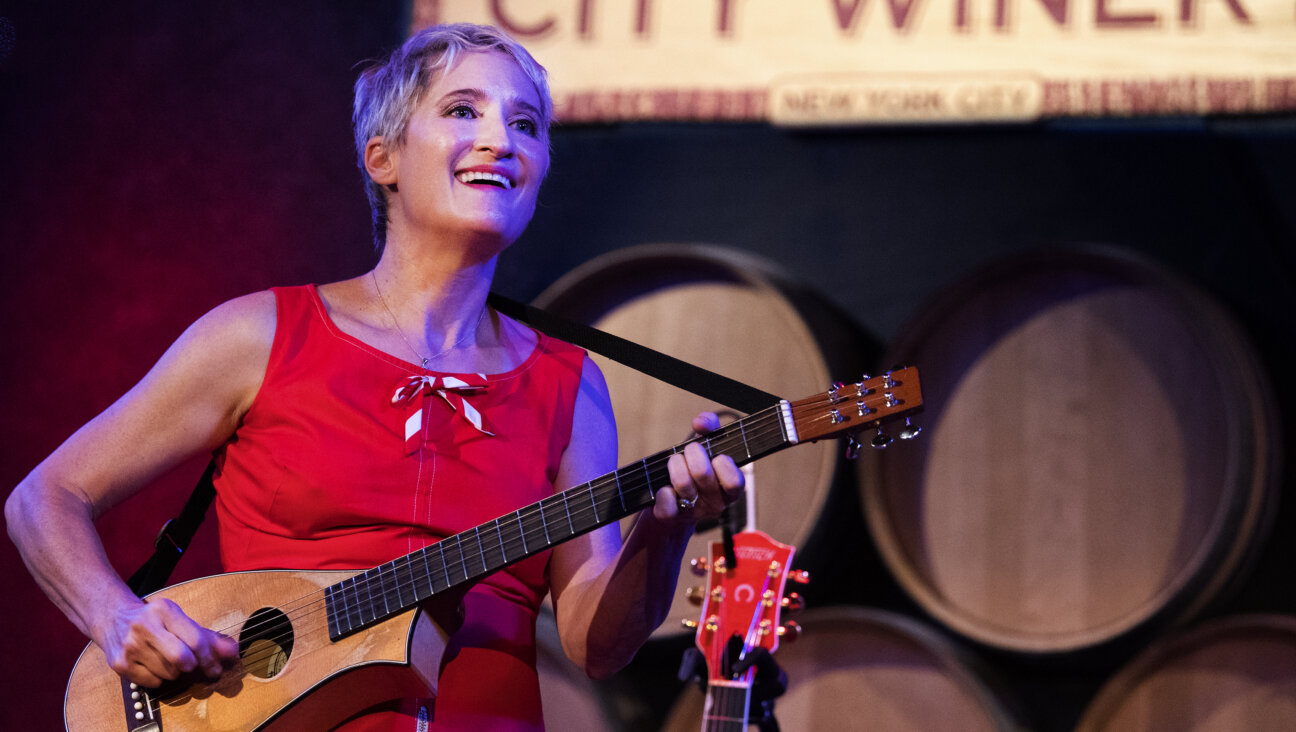The Meteoric Rise Of The A Capella Hanukkah Video — How A Holiday Force Awakened

Graphic by Angelie Zaslavsky
Star Wars fans have been eagerly awaiting “The Rise of Skywalker,” the final film in a nine-part saga scheduled to be released on December 20. Another set of fans — perhaps smaller in number but nothing to scoff at — have been anticipating an entirely different kind of production that pops up around this time every year: the Jewish a cappella Hanukkah video. This year, the two fan bases — stans of “Star Wars” and Jewish fellows singing sans accompaniment — might have some substantial overlap.
Six13, one of the main players in a young but vibrant tradition of celebrating Jewish holidays with a cappella music videos, has dedicated its annual Hanukkah offering to the beloved Star Wars franchise with an affectionate parody. Like the movie series it pays homage to, the video begins with static blue text against a starry background, but in this case, it reads “A long time ago, in a land not so far away…” Soon the signature crawl of yellow text receding away from the viewer tells the story of “The Rise of the Maccabee” and six voices sing a dramatic rendition of traditional Hanukkah blessings arranged to the tune of Star Wars’ iconic opening theme. The video ends with one singer using a lightsaber to set all the candles on a large menorah aflame.
For the members of Six13, along with their counterparts in groups like the Maccabeats and Y-Studs A Cappella, the question every year when Hanukkah approaches isn’t whether they’ll put out a video but what that video will be and how they can possibly top past successes. “It’s almost like a minhag, a tradition,” says Eitan Rubin, president of the Y-Studs. “This is part of the holiday.”
Just a decade back, none of this would have been obvious at all. Ten years ago Hanukkah came and went without much to-do on YouTube. But then, a viral hit changed things, making a cappella almost as much a part of Hanukkah as latkes and dreidels.
First, There Was “Candlelight”

Pardon Me, Boys: The Maccabeats pose in Grand Central Station Image by Maccabeats/Dani Diamond
On a Friday afternoon in November 2010, Uri Westrich posted a video he’d made with the Maccabeats — some of whom were his contemporaries at Yeshiva University. The guys soon turned off their phones and computers in observance of Shabbat. “Candlelight,” a Hanukkah parody of Taio Cruz’s smash hit “Dynamite,” was “intended as a holiday card for our friends and family,” says Julian Horowitz, a founding member and now music director of the Maccabeats.
But by the time the singers powered their devices back up, the video had already racked up a couple thousand views. A week later the count had risen to about a million, and the numbers just kept climbing. Suddenly, this student-founded a cappella group was famous — and getting inundated with booking requests for gigs and interviews and TV appearances, including on CNN and CBS.
“I don’t think I slept at all,” says Horowitz, who handled the slew of incoming inquiries. In hindsight, “of course, it launched who we are today,” he says. “It brought us into the modern era of the Maccabeats.” The group, which is no longer formally affiliated with YU, still tours regularly, flying in and out of cities all over the country.
“Candlelight” wasn’t the only Jewish a cappella video released for Hanukkah that year. Just a couple of days later, NCSY (formerly the National Conference of Synagogue Youth) posted “I Light It,” featuring Six13 singing a medley of parodies (including a take on “I Like It” by Enrique Iglesias ft. Pitbull).
Both “Candelight” and “I Light It” came out at a time when a cappella was having a mainstream moment. “The Sing-Off” and “Glee” had both premiered in 2009 and helped create hype around the genre beyond college campuses. (The movie “Pitch Perfect” would come soon after, in 2012.) “Suddenly it wasn’t a fringe thing,” says Mike Boxer, founder and director of Six13.
While it’s hard to say exactly what makes something go viral, the success of “Candlelight” in particular probably had something to do with the immense popularity of Cruz’s song, says Mordy Weinstein, founder of the Y-Studs and now both a member of Six13 and its booking manager. “It was the only song that mattered at the time. It had been huge for months and it was still everywhere,” he says. Mike Tompkins’ “Dynamite” cover video, which was released in September 2010 and inspired the Maccabeats version, was also incredibly popular. And though Hanukkah is not necessarily a major holiday in Judaism, its proximity to Christmas makes the season ripe for anything holiday-related.
Whatever the reasons behind the Maccabeats’ virality, “they didn’t just elevate themselves, they elevated the genre,” Boxer says. “We definitely saw an uptick in interest around when that happened,” he says. “They didn’t just make the Maccabeats popular. They made what the Maccabeats do popular. And that’s us. So we definitely benefited from that… From that point on, it was like everybody was off to the races to replicate that.”
The Video Is The Message

Trusting the Force: This year, Six13 enters the Hanukkah video sweepstakes with a “Star Wars”-themed parody. Image by Jessica Giovanetti
The videos have become one of the main, if not the, driving forces for the rest of the groups’ activities. In other words, the the videos’ popularity makes everything else possible — including the gigs large and small across the country and around the world, as well as several White House performances. (The Maccabeats, Six13 and the Y-Studs have each been invited at least once.) In a way, the videos are analogous to a ballet company’s “Nutcracker” production, bringing in new and bigger audiences, some of whom will come away with a taste for more. For ballet companies, “Nutcracker” income helps bring in revenue to fund other performances; for Jewish a cappella groups, holiday videos help create the demand for more performances.
“Whenever we post a video, directly correlated to how popular that video is, is how many gig inquiries we get,” says Weinstein. “That’s the aim: Put out videos and use it as a marketing tool and do more shows and get more visibility and grow the popularity of the group that way and put out more videos. It’s a cycle.”
Boxer has kept track of inbound inquiries over the last several years. “There’s always a spike in inquiries right around and right after we release a video,” he says. In December 2014, when Six13’s Hanukkah rendition of Taylor Swift’s hit song “Shake It Off” went viral (to date, it’s accumulated more than 2.8 million views), the surge of emails and calls was particularly high. The numbers do plateau again after each spike, but Boxer finds that the new baseline is usually higher than it was before.
“That is your primary shot at major marketing exposure for the year,” Boxer says. “When we do this, we do so much better. So what’s the return per dollar? I don’t know. But this is what keeps us relevant.”
Because even if your group doesn’t put out a video, another one will. After “Candlelight,” it became clear that “if you wanted to be taken seriously, you couldn’t not put out a video,” Weinstein says. “Otherwise you’d be left in the dust and everybody would hire the groups that put out videos.”
The Mission
What began as a fun holiday greeting to send to friends and family soon became the way multiple Jewish a cappella groups sustained themselves beyond the university context. “We get a lot of work out of it,” Weinstein says — so yes, the huge reach of online videos is a boon for the groups’ bookings. “But at the end of the day, we’re not in music because we want to make money.” And therein lies the more compelling purpose: The singers feel like the videos have given them a stage to reach Jews and non-Jews alike with positive, educational and entertaining images of Judaism.
After the haze of December 2010 lifted and the Maccabeats singers got some sleep, they started thinking about their next videos. “I don’t think there was a five year plan, but it was like, ‘Hey, we have this opportunity. We have this mission,’” Horowitz says. “‘Let’s use our platform to teach people about Jewish ideas, to bring joy to people on this holiday, to inspire people to be proud of their faith in a public setting.’”
The Maccabeats, Six13, and the Y-Studs all tell stories about the messages and comments they get online and the feedback they hear when touring all over the world that reinforces the notion that their songs and videos, silly or serious, have a real impact on the people who watch them.
“It never gets old to have somebody writing in and [saying], ‘I’m Jewish, but I’m in the middle of Nebraska and we’re the only family that’s Jewish in my town. I just feel so out of place…but this makes me feel so much cooler,’” says Boxer. It also doesn’t get old to receive a request for sheet music for what will be the only Hanukkah song someone’s public school choir will sing. Or to hear that folks are using the videos to teach their kids or Hebrew school students about the holidays.
If you pull up “Burn” by the Maccabeats on YouTube, for example, you’ll see a comment from an 11 year old who recounts being called “a f***ing Jew” walking home after Yom Kippur not long before encountering the video. “I haven’t stopped watching it. Thank you so much for doing this. It helps me feel proud,” he writes. Others talk about sharing the videos with their classes or playing them during family gatherings.
If the comments are any indication, however, the videos reach far beyond the Jewish population in the U.S. and abroad. Several start with “I’m not Jewish, but…” or “I’m a Christian…” or “I’m Muslim…” This is by design. “It’s really for everybody,” says Weinstein. “That’s part of the challenge of making these videos. There’s got to be a little bit of something for everybody — every age group, every kind of Jew, every kind of person.”
And if the musicians can project a positive image of Jews and Judaism — if they can entertain people while making Jews and Judaism feel relatable and familiar at a time when anti-Semitism is all-too prominent — then all the better. “This is the face of Jewish culture to the outside world,” says Boxer. “With the climate being what it is…it’s more important than it ever has been,” he adds. “Once a year we have one of the biggest platforms in Judaism so there’s a great social responsibility there.”
The Tradition Continues
It has been nearly a decade since “Candlelight” captured imaginations and set the stage for the slew of videos that have followed. The quality of the productions has gone up, new players like the Y-Studs and Kippalive have joined in, and everyone is experimenting.
There have been more fun pop song parodies (including “All About That Neis,” the Maccabeats version of Meghan Trainor’s “All About That Bass,” and “Uptown Passover,” Six13’s adaptation of “Uptown Funk” by Mark Ronson ft. Bruno Mars). There have been Broadway takes (including Hamilton medleys from both the Maccabeats and Six13 as well as a Les Misérables video from the former). There have been movie-related videos (including the Y-Studs’ La La Land-inspired video, “La La Passover,” and Six13’s “Bohemian Hanukkah,” released a few weeks after the Queen biopic hit theaters). There have been takes on traditional holiday prayers and songs (like the Maccabeats’ “Dayenu” in various musical styles and the Y-Studs upcoming take on the shehecheyanu blessing). There have been original songs (like the Maccabeats’ “Shine”). And there have been concepts and themes (like the Y-Studs anthem against anti-Semitism, a cover of Andra Day’s song “Rise Up,” and the Maccabeats’ “Candles on the Sill,” a version of Ed Sheeran’s “Castle on the Hill” that also served as a 10-year retrospective for the group).
“It actually created this tremendous pressure, which continues till today,” to figure out what’s next, says Horowitz. The creative strain of trying to top previous videos exists alongside an existential question. “How much longer is this going to go on? Was this a flash in the pan, a one-time — or at this point an eight- or nine-time thing? Or is this just the world that we live in now? I tend to think that it’s not going to last forever, because nothing ever does, right?” says Horowitz. “But maybe I’m wrong. Maybe this’ll be what we do until we retire. I don’t know.”
The Y-Studs are newer to the game; they released their first holiday video—“Seder,” based on Michael Jackson’s “Thriller” — for Passover in 2016. But they, too, grapple with the constant push to reinvent themselves. “The question we were asking this year and this holiday as we do every year and every holiday is, ‘Why?’ What exactly is going to be unique about this?” says Y-Studs musical director Gedalia Penner.
But they do it, because it has become its own tradition. “We’ve come to the realization that when something takes hold enough, it’s no longer just a novelty,” Boxer says. “People expect it. At the risk of sounding extremely egotistical, we’ve kind of redefined what is Hanukkah.”
Six13’s was the first video to go live this time around, but others aren’t far behind. The Y-Studs have one in the works and on Monday the Maccabeats were back with yet another Hanukkah video, as Horowitz had promised they would be back in November. “All that stuff I spoke about earlier about when will this end? This is not the year.”






















